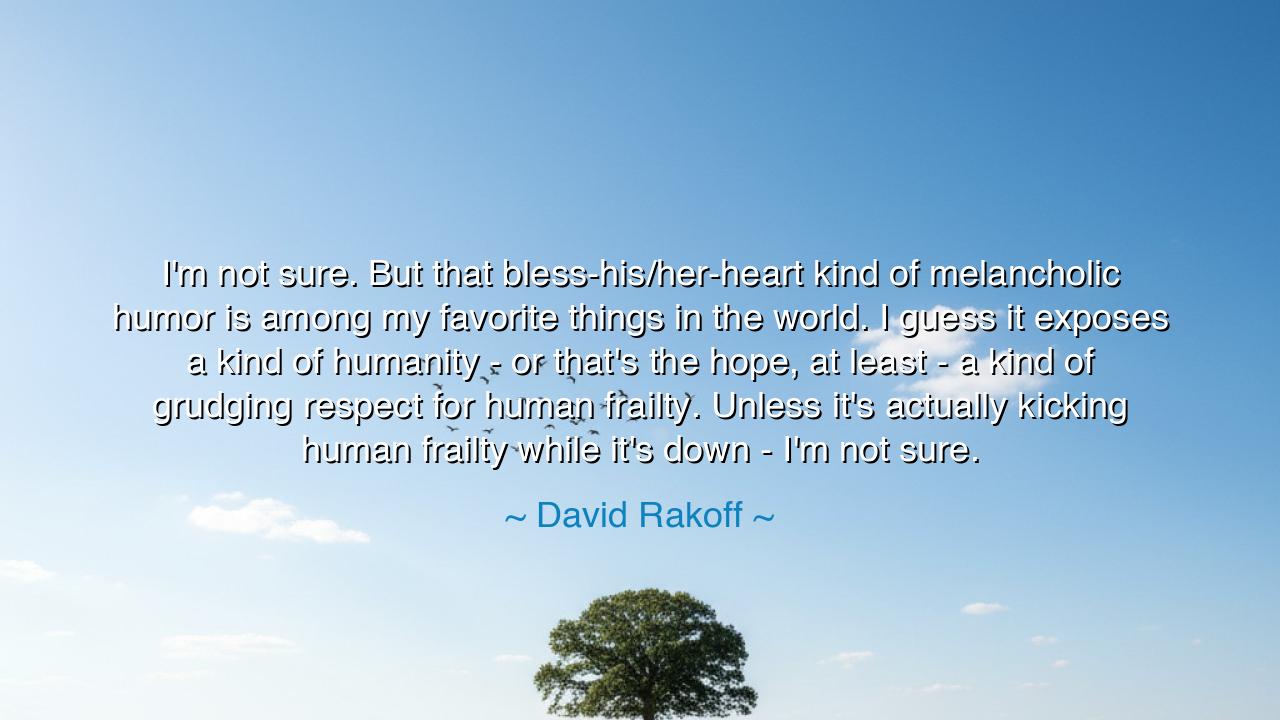
I'm not sure. But that bless-his/her-heart kind of melancholic
I'm not sure. But that bless-his/her-heart kind of melancholic humor is among my favorite things in the world. I guess it exposes a kind of humanity - or that's the hope, at least - a kind of grudging respect for human frailty. Unless it's actually kicking human frailty while it's down - I'm not sure.






In the vast and intricate landscape of human experience, where the sharpness of joy and the heaviness of sorrow often meet, there lies a kind of humor that transcends both light and dark. David Rakoff, in his reflection on the melancholic humor he holds dear, offers this poignant insight: "I'm not sure. But that bless-his/her-heart kind of melancholic humor is among my favorite things in the world. I guess it exposes a kind of humanity—or that's the hope, at least—a kind of grudging respect for human frailty. Unless it's actually kicking human frailty while it's down—I’m not sure." These words, deeply reflective, capture a universal truth about humor—that the deepest forms of humor often arise from the fragility and imperfection of human existence, and that it is this very frailty that makes us human.
In the ancient world, the philosophers and poets alike understood the profound connection between humor and humanity. Socrates, with his ironic wit, often used humor as a way to expose the contradictions in human nature. His dialogues were filled not with mockery, but with a subtle, melancholic understanding of human frailty. In much the same way, Rakoff speaks of a humor that is not mean-spirited, but rather a reflection of the human condition—a humor that does not seek to diminish, but to acknowledge the weaknesses and imperfections that make us who we are. It is this kind of humor that, in its sadness, also carries with it a deep respect for the vulnerability of life.
Consider the ancient tradition of tragic comedy, where laughter and tears were often intertwined. Aristophanes, the master of Athenian comedy, used humor to address the most serious of issues—politics, war, and society’s ills—yet his humor was never wholly devoid of compassion. His characters often exhibited the very human flaws that led to both laughter and reflection, revealing through their actions a deeper truth about the absurdity of life. In this, Rakoff’s melancholic humor aligns with the ancient tradition: a form of humor that may laugh at human frailty, but does so with an underlying respect for its inherent truth. It exposes the complexity of the human experience, allowing us to see the joy and pain woven together in the same fragile soul.
Much like Aristophanes, the ancient playwrights who wrote of human fallibility knew that to truly understand the human condition, one must see it from both angles—its absurdity and its dignity. The grudging respect for human frailty, as Rakoff calls it, is not merely an acknowledgment of weakness, but a recognition of the strength it takes to live through those weaknesses. To laugh at someone’s flaws is not to demean them, but to share in the recognition that we are all imperfect, all struggling in some way to survive the complexity of existence. It is this understanding that allows humor to act as a force of connection, rather than division.
Consider the ancient story of Odysseus, whose wisdom and courage are constantly tested throughout his journey. His journey is filled with moments of humor, often at his own expense, as he faces the dangers of gods and men alike. In Homer’s Iliad and Odyssey, Odysseus’ cunning, though often laughable in its absurdity, is a reflection of the human condition—how we all must use whatever tools we have at our disposal to navigate the world. Similarly, Rakoff’s humor—rooted in melancholy—exposes this shared humanity. It is the ability to laugh at one’s own foibles, to accept one’s own flaws, that gives life its richness and its resilience.
The lesson Rakoff offers us is both deep and transformative: to truly understand and appreciate the complexities of life, we must learn to embrace the humor that arises from the fragility of human existence. It is not enough to simply laugh at the absurdities of life—we must learn to respect them, to see them as a reflection of our shared vulnerability. Whether in our personal struggles, in the suffering of others, or in the humor we share with those we love, we must approach the world with the understanding that humor does not always seek to diminish, but often to elevate. It is in the recognition of our own weaknesses that we find the strength to face the world with compassion and resilience.
In our own lives, then, let us take Rakoff’s wisdom to heart. Let us seek to find humor not in spite of life’s difficulties, but in the very heart of them. Let us embrace the absurdity of the human condition with both laughter and respect, recognizing that it is through humor that we can share in the truths of our existence. Laugh at the imperfections, not to mock, but to connect—to recognize that in our shared frailty, we find the strength to move forward together. For in the end, humor, when approached with humility and understanding, is not just a means of survival, but a way to celebrate the beautifully flawed nature of the human experience.






AAdministratorAdministrator
Welcome, honored guests. Please leave a comment, we will respond soon